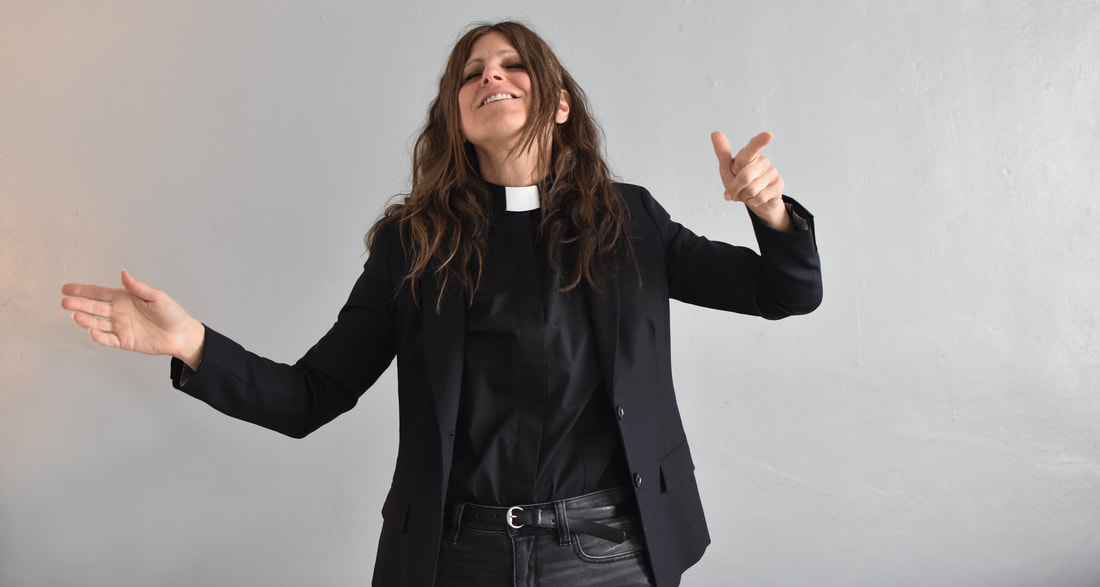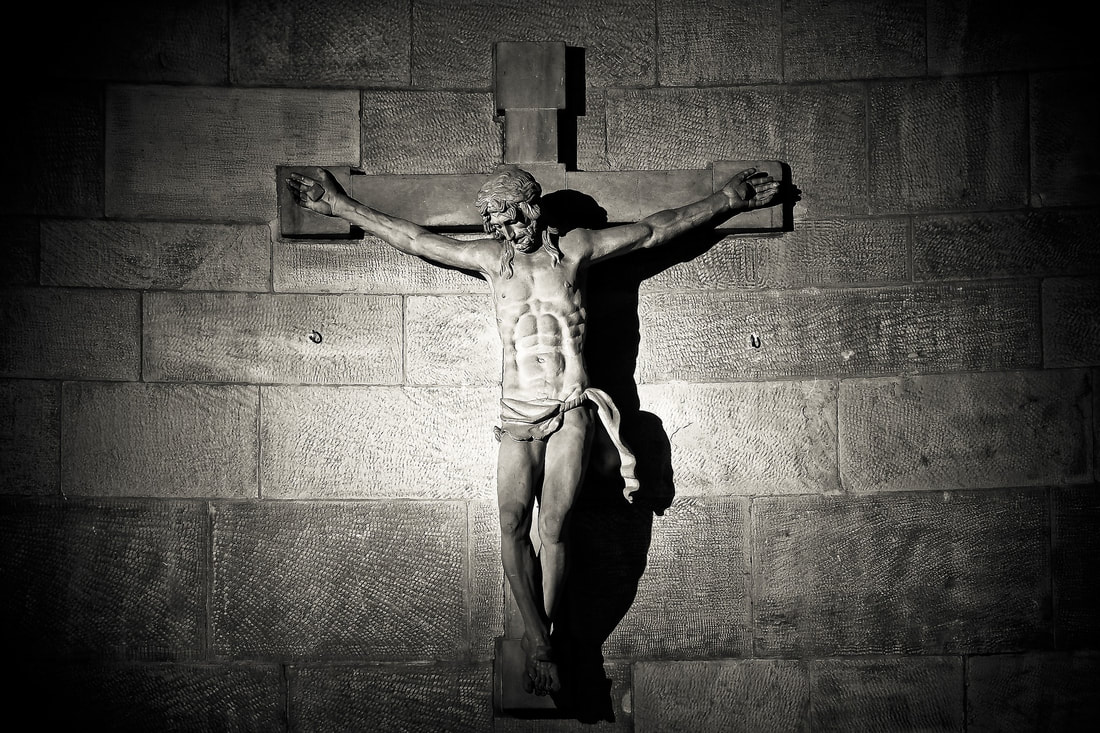|
I was harassed by someone on my own mailing list this week. After months of following me, I guess she just now realized that not only did I have a call to priesthood, but that I was going to be ordained. She blew a gasket, and felt she must—for my own good—try to stop me.
In the first email, she sent a link to a blog post of a canon lawyer who explains why the ordination of women is not valid. The next morning—before I had a chance to respond—she sent me another email with a link to an article about a woman excommunicated for receiving holy orders. This time she proceeded to lecture me on the particulars of excommunication (as if I didn't know), and then implored me to “cease and desist” with my sin of ordination. Being a good Jesuit, I put the best interpretation on her messages. I explained to her that I understood that she felt genuine concern for me and I appreciated that. I went on to say, however, that we were in very different places on the issue. I encouraged her to educate herself, and to consider confronting her own internalized sexism. Then, I asked that she refrain from emailing me anymore about it. Naturally, she ignored my request and sent another more forceful—almost nasty—email quoting the classic arguments (*yawn*) of John Paul II’s Ordinatio Sacerdotalis. The Church has no authority to ordain women, she exclaimed! Didn't I know that as a woman I cannot act in persona Christi! She demanded that I stop my “fake ordination” before I jeopardize my soul and the souls of those I serve. Dear God. Again, I responded only that she educate herself on the issue and nothing more. And, guess what? Yup, she emailed me AGAIN! This time a full-on snarky message daring me to refute her, and sarcastically telling me to check with Pope Francis to see if anything has changed on the position of women’s ordination since JPII’s pontificate. Wow. I could go on and on about this email exchange, but instead I will spare you and say only two things. First, her behavior so clearly reveals the sinfulness of the Church. This woman, an otherwise intelligent human being, actually believes deep down in her heart that an all-powerful Creator simply cannot work through women's defective bodies and, therefore, women must be subjugated to a male authority. Not only is this heartbreaking to witness, it is a moral outrage that a Church with a mission of salvation for all people maims its disciples in this way. And second? The thing that exasperates me most about this exchange is the same thing that sent me skyrocketing to the moon after reading Paul Baumann’s appalling article in Commonweal: people have the gall to speak to me or about me as if I am a child—as if I am anything other than a thinking, praying, discerning individual who is capable of making mature decisions rooted in a vibrant relationship with God. Somehow, simply by virtue of being female, I am to be dismissed as incapable. It is, in a word, *infuriating.* The thing is, the woman who harassed me this week acted just like Joshua in today’s first reading. Deeply threatened by the prophetic work of the Spirit, her impulse was to try to stamp it out—to obliterate it. While it's easy to point the finger at her, every single one of us is guilty of behaving like this sometimes. After all, it is natural to want to cling to what we think we know. However, this just isn't the Christian way. Instead, our path as Christians is to be docile enough that we are continually changed by the wisdom of the Spirit. May we all have the humility to be so transformed. I went to Mass for the first time in weeks. Lately on Sunday mornings I have been presiding over an online Liturgy of the Word, so I hadn’t been in a while. I love going to Mass at this particular Church. They take great care with the liturgy, and the homilies are always excellent. It’s also a positively beautiful space, every inch designed with prayerful intention. I feel fed here, and I am grateful every time I step foot in the building.
But today, I struggled. You may recall some months ago that in anticipation of holy orders I began acting as if I were already excommunicated. The Roman Catholic Womenpriest movement as a whole rejects excommunication because it sprouts from an unjust law of exclusion. I get this, and I support it. Yet, I don’t practice this personally. Instead, I publicly accept the punishment, partially out of respect for the institutional Church, and partially because I think it’s important that the Body of Christ witness how women pursuing priesthood are treated. When it is time for communion, rather than take it with everyone else or remain at my seat, I approach the altar with arms crossed to signify my exclusion. I want everyone in the place to see the symbolic image of the male authority rejecting the female priest following her call. I have done this a few times now, and it’s hard. But today, I got choked up. Maybe it’s because my impending ordination is so close. Maybe it's because right at the moment I was about to approach the priest, the music rang out—something like, “In your goodness, we are offered a seat at the table.” With this claim to radical inclusivity resounding in my ears, I stepped up to the priest with my arms crossed in front of my chest, the only one in the place unable to receive communion. I walked back to my seat shaking, hot tears rolling down my cheeks. Sitting in silence I let the emotion wash over me. I recalled Judy, a woman who shared recently that she has been called to priesthood her entire life. She is elderly now and it is almost certain that she will not get the chance to serve as a Roman Catholic priest. I grit my teeth with resolve: little girls will not have to endure this exclusion when they grow up. A few minutes later, Mass concluded and the recessional song began. It just so happened to be the very song I chose for the recessional of my first Mass, which will be held five weeks from today. My face broke into a smile. That deep down kind of smile, when you know the Lord has done something just for you. God never fails to remind me that whatever challenges I face on this journey, God will be right there with me. Even amongst the hardship, I have much to celebrate. For, as today’s psalmist proclaims with joy, the Lord indeed upholds my life. I cried a lot this week. For one thing, I had to make the decision between streaming my ordination for friends and family, and having a dear friend vest me during the ceremony. This person works for a Catholic school in a high profile job and if they are seen at my ordination, they could—and probably would—be fired. I talked it over with them and knew almost immediately what I would do. Still, I wanted to pray about it. After we ended our Zoom call, I silenced myself and asked the Lord for guidance. Within a few moments, God's answer bubbled up from deep in my chest: “I want them to vest you.” "Okay," I said. I sat with God a few more minutes, allowing God to console me. Then, I texted my friend to let them know my decision: both God and I simply cannot imagine having anyone else perform this ritual.
Another thing that troubled me this week is that I still don’t have music for my first Mass. Because I am outside the institution, no musicians that play for the Catholic Church will touch me. One of the music ministers in another denomination had agreed to work with me, but then she experienced a tragic loss in her family (please keep her in your prayers—she needs them). I then got another name through the Church where my first Mass will be held, and I reached out to her. It will be wonderful if she can help me (and I hope she can!), but I realized that I had to just let go of any attachments to things being a certain way. If I don’t have music for my first Mass, then I don’t have music: this is what excommunication looks like. Also, I went back to working full-time this week. I was *very* blessed, privileged really, to take four weeks of leave from my place of employment to focus on ordination weekend. Formation. Sacramental preparation. Preaching. Liturgical design. Writing. Meetings with Clergy. Event planning. Promotions and marketing. Prayer. Reflection. Sleep...glorious sleep. For four weeks, I got a taste of what it is like to be a full-time priest—to have a man's experience, frankly—and it was difficult to give it up. Of course, none of these things are earth-shattering by any means, especially in context of the immense hardship we witness in our world each day. Still, in order to prevent them from taking a toll, I have to be honest and acknowledge that they hurt me. This path is lonely and hard and often sad, and some days I have to hang my head and grieve all the ways I am punished, both large and small, simply because I am a woman. At the same time, I am undeterred. God fortifies me for this road, and like Isaiah in today’s scripture, I willingly accept my punishment on behalf of women and girls everywhere. Someday, we will have justice, for that is what God has promised us. Therefore, no matter what anyone says or does to me, I stand tall with God at my side: "I have set my face like flint, and I shall not be put to shame.” This week I received my very first chasuble. If you are not familiar with the Roman Catholic ordination rite, right after I am ordained I am vested for the very first time as a priest. Two close friends in the Lord will lovingly dress me in my stole and chasuble, and then present me to the congregation. It is a most touching ritual, one I will experience only once and remember for the rest of my days.
When the package from the manufacturer arrived, I placed it on my bed and cautiously opened it. I have never owned something so beautiful. The royal fabric shimmered up at me. I removed the chasuble with care, shook it out, held it up, and stared at it. After a few moments, I gently pulled it over my head and turned to survey myself in the mirror. The woman staring back at me was a priest. I looked deep into her eyes....and smiled. How many of us have felt stopped from becoming who we truly are? Maybe we have internalized family expectations. Maybe we have accepted bogus cultural prescriptions. Maybe we have been crushed by institutional prejudice. Still, something very deep within us fights to express itself, to rise to the surface, to be seen and accepted and celebrated. I have waited so long for this moment and I feel alive. But, I also got a reality check. Not too long ago I bumped into a priest friend and, after some conversation about my ordination, he said with care, “I know you are excited, and you should be. It’s a joyous time. But, beware: you are painting a target on your head and, at some point, the weight of that stole around your neck will become very heavy.” I know that he was speaking from experience. I also know that what he was saying is true. Still, this doesn't stop me. After all, nowhere in scripture or tradition are we promised that the road to holy self-expression is easy. It isn't. It requires prayer and patience and fidelity and sacrifice and courage. But, if we want to become who we are, we must first give ourselves the permission to become. Once we do, God's Holy Spirit will rise up within us, take our soul by the hand, and guide us to that person we are meant to be. I need to pray about how to engage with the Bishops. I vacillate between anger and rage at the fact that I am kept out of the priesthood simply because I am a woman. At the same time, I have steeled my resolve: we will get this teaching changed in my lifetime. And somehow I know in my bones that these two things are interconnected. Holy anger rooted in prayer will pave the pathway to justice. And so I am compelled at the deepest level of my being to channel all my fury into one target: the Bishops.
But Fr. Anne, you may protest, this does not sound like Christian love. I get how one could say this. But, at the same time, I think it depends on how you understand love. If you notice, love—real love—is not always compassionate. Take today’s gospel, for example. The Pharisees and scribes criticize Jesus’ disciples for violating practices of ritual purity, and Jesus responds by giving them a very public dressing-down about the ways they manipulate tradition for their own self-interest. Consistently, throughout the scriptures, Jesus has very little patience for those in power who abuse their authority—and the tradition—in service of their personal agenda. He speaks truth to power, and, well, it isn’t pretty. It is, in fact, what ultimately leads to his execution by the State. So, what about the Bishops? After we prayed the Liturgy of the Word this morning via Zoom, I had a very interesting conversation with the congregation about this very question. Someone offered a poem as a touchpoint for my prayer: They drew a circle that shut me out-- Heretic, rebel, a thing to flout. But Love and I had the wit to win: We drew a circle that took them in! -- Edwin Markham The Bishops have drawn a circle so tight that they are now trapped. Yet, after almost five decades of trying to dialogue with the hierarchy, of providing the historical evidence, the theological thinking, the pastoral ministry—of attempting to draw a circle that includes them—we have gotten nowhere. As a result, it is more than understandable that some may feel that the onus is now on the Bishops to widen the circle. But what crystalized for me in this conversation is that I feel very differently. I am not waiting any longer for them: it is up to us to tear down the circle, if not for me and for you, then for all the young girls across the globe who are learning through our Church that they are somehow less than fully human. Then, like a bright light, someone said, “And once the circle is torn down, then all the men who are trapped inside become liberated, too.” This, my friends, is real love. When I take a closer look at Jesus, I notice that he never critiques who a person is, only what a person does. This is perhaps the key to being a prophet. Even when angry, disappointed, or frustrated, Jesus always desires liberation for the very people he criticizes. Jesus never fails to love. May we follow this path of love as we work in earnest for that sweet, sweet liberation for you, for me... and for our Bishops, too. I am jealous of Elle Dowd. I heard her on Speaking in Church, a feisty podcast hosted by Spencer Rose Taylor and Josie Jael Jimenez that highlights deconstructionist voices across the Christian tradition. Elle is on the ordination track in the Evangelical Lutheran Church in America, and she just published what looks to be a fantastic book called Baptized in Tear Gas: From White Moderate to Abolitionist.
When I was listening to Elle speak, I found myself utterly engaged….and jealous. She is so gifted, so well-spoken and so inspired that I couldn't help but become a fan. As a young woman, she has already accomplished so much: gone on mission, adopted two girls, built a loving family, received her degree, written a book. She is an unstoppable force for justice, and she does it with flare--rocking her clerical collar with a poofy white skirt and platform heels. It’s not Elle’s fault I am jealous. She is living her best life and it’s really important for me to see the success of women in traditions that fully embrace all that women have to bring to the table. In ministry. In leadership. In life. The bigger person deep down within me celebrates her for the great gift she is to the Christian Church. But also, I shouldn't romanticize: I am quite sure she has many of her own challenges to face. But as much as I dig her, I would be lying if I didn’t acknowledge this other part of me—the part that feels small, petty, trapped. I simply cannot live out my vocation in the same way Elle can. I toil away day after day trying to make a life as a Roman Catholic priest in a tradition that refuses to acknowledge my call. I work a full-time secular job while attempting to generate a ministry on the side. There are many days I feel exhausted and sad, and I question whether anything I do makes any difference at all. I have to be honest and admit that maybe my work doesn't make a difference, at least in terms of any headway in the Roman Catholic Church. But, deep down I know that even if I will never be allowed to live out my vocation the way God intends, my yes makes a difference to God. God is moved and inspired by my yes, and isn’t that what life is all about? My road is uniquely my own—as is all of ours—and each one is of supreme significance to God. As I pray with today’s gospel, Elizabeth is my teacher. As an older relative, Elizabeth offers an authentic deference toward and loving affirmation of the much younger and more gifted Mary. I follow her lead and offer gratitude and reverence to Elle. "For at the moment the sound of your voice reached my ears, my spirit leaped for joy.” Thank you, Elle, for your fierce and fearless ministry, and for teaching this girl a thing or two. Dear Paul Baumann,
The article that you wrote for Commonweal in response to the New Yorker article on women called to the Roman Catholic priesthood was remarkably sloppy. Rather than waste my time with the exceedingly boring task of deconstructing an argument that simply boils down to good old-fashioned sexism, I want to address your lack of basic journalistic integrity. To start, you claim in regards to us women who are called that “there is something jarring about [our] conviction that the Church exists to ‘meet [our] needs’ and will ‘fall into irrelevance’ if it does not.” Here, you are attributing the words of a parishioner in a female priest’s community to the four of us. Yet, none of us offers any such sentiment about the Church existing to meet our needs. Rather--if you actually read our stories carefully—it is plainly obvious that each of us has been deeply shaped by the Church to serve the Church. So much for your claim that we have “little appreciation” for the Church’s role in forming us. You go on to characterize us as clamoring for “self-determination.” Once again, the four of us do not speak about our vocation to priesthood in this manner. Quite the opposite: our stories point clearly to the reality that it is God who is determining who we are—not us—and we are simply struggling the best we can to honor God’s desires. Nonetheless, you take Natalia Imperatori-Lee’s comment regarding women’s desire in general “to be seen as human beings with the capacity for self-determination” out of context and use it to reduce our vocations to mere “self-expression.” What you call “self-expression," we call honoring the Holy Spirit within us. Next, you say that we “repeatedly declare a love and attachment” to “Catholicism’s ‘rituals, its liturgy, and its tradition of service to the poor.’” Yet, again, you extract a phrase Talbot uses to describe the type of Catholics who are drawn to worship in one particular congregation, and weaponize it as a way to dismiss our vocations as some kind of “liberal Western sensibility.” And so what if we love ritual and Catholic Social Teaching? We are Roman Catholic, after all. And while you get to sit on your throne with every male privilege and judge us, we have to draw from the very bedrock of a faith that is nourished by liturgy and the social justice teachings in order to have the grit necessary to walk the excruciating path of a call to ordination. Finally, at the end of the article, you claim that “some of the women” in this article are “sadly” telling Roman Catholics to basically “forget their common past,” which amounts to telling them to “’get lost, die off, and disappear.” However, not one of us says anything remotely resembling this sentiment. In fact, many of us are educated ministers with seminary degrees from reputable institutions who practice a faith and leadership deeply rooted in the Roman Catholic tradition. Frankly, I am not sure how it is possible to read the article by Talbot with any care whatsoever and produce the article you did. If I made errors of this magnitude at my job, I would be fired. What I find most appalling about your piece is that it is plainly evident that you do not trust that we as women are mature, thinking, praying adults who are quite capable of discernment. Thank you for modeling so clearly the manner in which some men feel they are entitled to dismiss women as if we are children. This is precisely the problem, is it not? In closing, let me wrap it up for you: you messed up, dude, and big time. You owe us an apology. I expect to see it in the next issue of Commonweal. Fr. Anne Tropeano, ARCWP This week I was interviewed on the very cool On a Mission podcast with Molleen Dupree-Dominguez. One of her questions was, "How did you come to know you were called to be a priest?" You’ll have to wait until September when the episode drops to hear the full story, but here’s a few tidbits. When I finally learned to pray at St. Ignatius Parish—and then to discern—I started to hear the words from the Spirit bubble up from the depths of my heart: “You are my priest.” I crooked my neck and furrowed my brow every time I heard it. How can God be asking me to do something that isn’t possible?
I started engaging with the call. I couldn’t become an actual priest, so I figured the call must have meant something else. Maybe I was supposed to minister to priests. I began to offer as much support as possible to the Jesuits living near and working in the parish. This was not much of a sacrifice since I loved being around them. I especially doted on one elderly Jesuit, Fr. Tom Royce, SJ. He was in his 80s, hard of hearing, and losing his vision. Nonetheless, he was sharp as a tack and still *extremely* active, and so he needed help with all kinds of things. For example, after 50 years of saying the same rendition of the Mass, he had to learn the new translation and required someone to assist. He also needed exercise lest he become entirely hunched over, so I started taking him to the therapy pool. I’d never seen him so happy as when he was in the water. I also noticed that he loved suspenders, so I bought him a checkered pair to match his clerics. He wore them everywhere. Special times. (Thankfully, after he passed, a friend hung on to the candles from his ordination. They will be on the altar at my own ordination.) And so it went: me hearing the call, me continuing to grapple with what it meant. I signed up for every liturgical ministry you can name: Eucharistic minister, sacristan, lector, funeral sacristan. I became a liturgical coordinator, taking on huge events that spanned days at a time. I brought communion to the sick and dying, and I started a young adult program. I was trained as a spiritual director and learned to lead retreats. I organized parish life events. Eventually, I went on to get my Master of Divinity degree, and I even ran a parish. Along the way, I prayed through joining other traditions and becoming a nun and remaining a pastoral minister. But, finally, I had to accept the fact that none of these paths were it. Twelve years later, I felt I was no longer able to grow in the way God desired. I finally let go of all my expectations about my life, about my call, about who I thought I would be. It was only then that the path unfolded before me: I was to become a female Catholic priest committed to reforming the tradition. When I think back to my honest reaction to God's asking me to do something impossible, I just have to laugh. I was so naïve--so green! For as today’s gospel reminds us, this is what God does. God asks us to take on the impossible challenge only to reveal that it was never impossible at all. And so I lift up to to God my offering of five barley loaves and two fish. I can’t wait to see what God does with it. Everyone has an opinion about what I am doing. They love it! They hate it! I should do “x!” I should NOT do “y!” People have thoughts on how I present myself, what I say, what I wear, who I am. I'm a heretic. I'm a hero. I'm sick. I'm strong. I'm being led astray (as if I don't have my own thinking mind and praying heart). I'm on the path of the Holy Spirit. Most recently, a friend and kindred spirit told me that a friend of his read the New Yorker article and in the most kind and sincere way said, “I respect what she is doing, but I cannot help but feel her efforts will be a waste.” Ouch.
In one way, all this energy is thrilling. The sheer fact that people respond so strongly in this or that way means that I am up to something very important. And, as excruciating as this path is, I feel alive. Not to mention, people often times share things that are extremely helpful, and I feel God’s touch through them. But, on the other hand, there is so, so much noise. It’s easy to feel hurt or confused or hesitant or dejected. After all, I am not even ordained yet: I am just a fledgling trying to find my way step by step—slowly discovering who I am as a priest. This formation is not something that can be rushed, but it can be delayed if I get knocked off course. When I catch myself marveling at all the commentary, I recall a conversation that I had some months ago with an Episcopal priest. She was about my age, give or take, and shared that she had been a priest for 23 years. Twenty-three years! I was taken aback, literally knocked backwards. I was amazed. Her gender was a non-issue: she was able to follow her vocation as a young woman, and she has had a long and fruitful career doing what she loves—what God has called her to do. She was able to say “yes” without one word about it. With all that swirls around me, I am keenly aware that more than ever I must stay rooted in the Spirit. Like the disciples in this Sunday's gospel, I return from my work of the day to eagerly share in my prayer all that has transpired with Jesus. He listens, sympathizes, teases. Then, he takes me by the hand and leads me to a deserted place. There, the quiet blankets all the noise within me and God’s voice swells up through the silence to teach me about the path, about who I am. It is my goal that someday, when I am old and gray, I will have the distinct pleasure of watching young women enter the Roman Catholic priesthood without one word about it. As long as that prayer glows in my heart, my efforts will never be wasted. My Facebook page transformed overnight from a place of support and encouragement to one of harassment and cruelty. It is clear that some people do not appreciate my challenge to long-held traditions—traditions they rely on to make sense of the world around them. My ministry threatens their worldview, and so they lash out in an effort to keep things stable and familiar.
I have been diligently praying through the comments and reactions, trying to discern whether and how to respond. I have to take the time to sort through the emotions that rush to the surface. I ask the Spirit to look with me, to teach me about myself, about the situation, about the path forward. Only when I reach a place of inner freedom do I respond with loving kindness to those who degrade me. I do this in a true effort to make a respectful connection across the great chasm of difference between us. I have mixed feelings about it. On the one hand, perhaps it is a waste of time. Have I really changed anyone’s mind? Also, it is draining, and it is particularly demoralizing to see this behavior from women--especially young women--who have internalized the Church's sexism so completely that they actually believe women are deficient. On the other hand, it’s important to show what female priests experience. The anger. The derision. The hatred. The disrespect. There it is, in black and white: the tangible effects of a Church doctrine that teaches inequality. There is no denying the darkness. And practically? Well, its good practice: I need to sharpen my chops. I want to be like Rev. Shanon Sterringer, who swooped in on my page and blasted these folks with both barrels. She is so educated, so competent and so articulate, no one can touch her. My goal is to be like that. After all, the more support I gain, the more public condemnation I will receive. (I will really know I’ve made it when I start receiving death threats.) An interesting effect of this ongoing harassment is that I feel much closer to Jesus--and in a new way. For the first time, I have a *tiny* taste of his particular experience of rejection and humiliation. In my prayer we were sitting together on the trunk of a fallen tree at the edge of a meadow. He looked at me and with a wry smile said, “It’s not that fun, is it?” Shaking my head, I chuckled, “No, it isn’t.” He skooched closer, threw his arm over my shoulder, and we laughed. “Don’t worry,” he said, “I got you.” What I realized this week on a visceral level is that I have to come to grips with the reality that an important part of my ministry is enduring this abuse. I cannot let it eat away my spirit and my stomach lining. Instead, I must welcome it, purify it, and offer love back as a response--and to do all this as prayer... for the Church, for God, and for justice. This is the way of Jesus, and it is the only way the cycle of darkness can be broken. It is perhaps true that most people would much rather have things remain the same--even if that means sacrificing the salvation God is so generously offering. But convincing people to change is not the point. As the reading this week from Ezekiel reminds us, God does not ask us to bring about results necessarily, but rather to be faithful to what God calls us to do--who God calls us to be. For the point is that, whether the people heed or resist, it is through us and our love that they shall know that God’s Spirit has been among them. |
Support Church justiceArchives
March 2024
|








 RSS Feed
RSS Feed